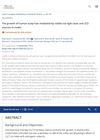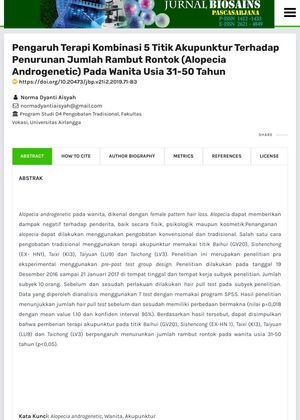TLDR Acupuncture therapy significantly reduced hair loss in women aged 31-50 with female pattern hair loss.
The study conducted from December 19, 2016, to January 21, 2017, investigated the effect of acupuncture therapy on reducing hair loss in women aged 31-50 suffering from androgenetic alopecia, also known as female pattern hair loss. The traditional treatment involved acupuncture at five points: Baihui (GV20), Sishenchong (EX- HN1), Taixi (KI3), Taiyuan (LU9), and Taichong (LV3). The pre-experimental research used a pre-post test group design with 10 subjects. Hair pull tests were performed before and after the treatment. The results showed a significant difference in the number of hairs lost before and after the treatment (p=0.018, mean value 1.10, 95% confidence interval). The study concluded that the acupuncture therapy significantly reduced hair loss in women aged 31-50 (p<0.05).
 91 citations
,
August 2015 in “Anais Brasileiros De Dermatologia”
91 citations
,
August 2015 in “Anais Brasileiros De Dermatologia” Female Pattern Hair Loss affects women's self-esteem and needs more research for better treatment.
 1 citations
,
January 2015 in “Journal of Aesthetic & Reconstructive Surgery”
1 citations
,
January 2015 in “Journal of Aesthetic & Reconstructive Surgery” Hair transplantation is the best treatment for hair loss, with new technologies improving results, and stem cell and gene therapies may treat severe baldness in the future.
 117 citations
,
September 2013 in “Lasers in Surgery and Medicine”
117 citations
,
September 2013 in “Lasers in Surgery and Medicine” Red light therapy at 655 nm significantly improved hair growth in men with hair loss.
 51 citations
,
January 2012 in “Annals of Dermatology”
51 citations
,
January 2012 in “Annals of Dermatology” Asian hair loss differs from Europeans; consider individual needs and psychological well-being for treatment.
 June 2022 in “Frontiers in Medicine”
June 2022 in “Frontiers in Medicine” Acupuncture and moxibustion may help treat hair loss, but more research is needed.
3 citations
,
April 2020 in “Medicine” Acupuncture may be a safe and cost-effective treatment for Seborrheic alopecia.
 1 citations
,
January 2018 in “Springer eBooks”
1 citations
,
January 2018 in “Springer eBooks” Photobiomodulation is an effective and safe treatment for increasing hair growth in people with hair loss.
 16 citations
,
September 2018 in “Journal of Ethnopharmacology”
16 citations
,
September 2018 in “Journal of Ethnopharmacology” Plant-based remedies may treat hair loss by reducing inflammation and improving insulin resistance.
 March 2020 in “Journal of Cosmetic Dermatology”
March 2020 in “Journal of Cosmetic Dermatology” Hair loss affects self-esteem; patients seek effective, low side-effect treatments.








